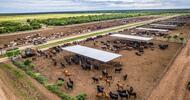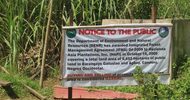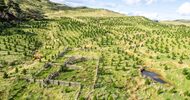The solution to the food crisis exists, and is being fought for in many communities. It is called food sovereignty. We need to stop corporate land grabbing for industrial agrofuels and commodity production.
As the vicious food price crisis deepens, transnational companies are moving into southern countries on a huge scale and starting to capture millions of hectares of land in order to bring agricultural production further under their control for industrial agrofuel and food production for the international market. Millions of peasants will be pushed out of food production, adding to the hungry in the rural areas and the slums of the big cities. The few that remain will work under full control of the transnational companies as workers or contract farmers.
D’un côté, les multinationales et les pays acquéreurs de terres agricoles à l’étranger : pour eux, cela ne fait aucun doute, ces contrats représentent une opportunité pour des pays parfois très pauvres. De l’autre, les mouvements écologistes et les associations de défense des droits Humains : ils dénoncent le déséquilibre de ces contrats et les dérives inéluctables d’une telle pratique.
- Le Quotidien
-
23 January 2009
It has now emerged that the land in question is part of the fertile Tana River delta in Coast Province, the same stretch where plans by Mumias Sugar Company to build a sugar factory have raised objections from pastoralists claiming that their animals will lack pasture and the environment will be destroyed.
- Daily Nation
-
19 December 2008
Común a todas estas operaciones, la de Daewoo incluida, es su secretismo. ONG e instituciones desconocen la totalidad de hectáreas compradas por foráneos en países pobres y a falta de que se publiquen estudios en curso, sólo pueden hacer estimaciones.
Some fear that the land grabs could worsen poverty because few benefits will flow to the poorer host countries, and small farmers could lose out. Although the UN Food and Agriculture Organisation (FAO) is drawing up guidelines to protect their interests, it is far from clear whether anyone will follow them.
- Sunday Herald
-
07 December 2008
Nomadic herders, rarely a priority for governments, are being dispossessed by bioethanol developments in Kenya, says Michael Taylor of the International Land Coalition (ILC), and they also depend on the “unused” land that Madagascar offered Daewoo.
- New Scientist
-
04 December 2008
La chute du cours des céréales sur les marchés mondiaux n'a pas stoppé la course aux terres agricoles par les pays qui en manquent.
- Le Monde
-
20 November 2008
A lot of countries don't grow nearly enough food to feed themselves. Britain is one; South Korea, another. The giant South Korean conglomerate, Daewoo, has come up with a novel way of solving the problem of food security. It has leased a vast tract of land, 1.3 million acres, on the African island of Madagascar.
As the Gulf's agricultural production rates slow and food prices around the world continue to rise, GCC members are investing heavily in the fertile lands of Africa and Asia.
Interview with Sudanese government and FAO officials on leasing farmland to foreign investors
Conséquence directe de la crise alimentaire mondiale et de la volatilité des cours, les projets d'achat ou de location de terres agricoles à grande échelle, parfois sur des centaines de milliers d'hectares, se multiplient.
- Le Monde
-
23 September 2008














